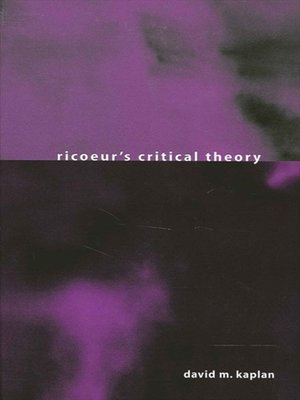Ricoeur's Critical Theory
ebook ∣ SUNY series in the Philosophy of the Social Sciences
By David M. Kaplan

Sign up to save your library
With an OverDrive account, you can save your favorite libraries for at-a-glance information about availability. Find out more about OverDrive accounts.
Find this title in Libby, the library reading app by OverDrive.



Search for a digital library with this title
Title found at these libraries:
| Library Name | Distance |
|---|---|
| Loading... |
The first book-length treatment of Paul Ricoeur's conception of philosophy as critical theory.
In Ricoeur's Critical Theory, David M. Kaplan revisits the Habermas-Gadamer debates to show how Paul Ricoeur's narrative-hermeneutics and moral-political philosophy provide a superior interpretive, normative, and critical framework. Arguing that Ricoeur's unique version of critical theory surpasses the hermeneutic philosophy of Gadamer, Kaplan adds a theory of argumentation necessary to criticize false consciousness and distorted communication. He also argues that Ricoeur develops Habermas's critical theory, adding an imaginative, creative dimension and a concern for community values and ideas of the Good Life. He then shows how Ricoeur's political philosophy steers a delicate path between liberalism, communitarianism, and socialism. Ricoeur's version of critical theory not only identifies and criticizes social pathologies, posits Kaplan, but also projects utopian alternatives for personal and social transformation that would counter and heal the effects of unjust societies. The author concludes by applying Ricoeur's critical theory to three related problems-the politics of identity and recognition, technology, and globalization and democracy-to show how his works add depth, complexity, and practical solutions to these problems.







